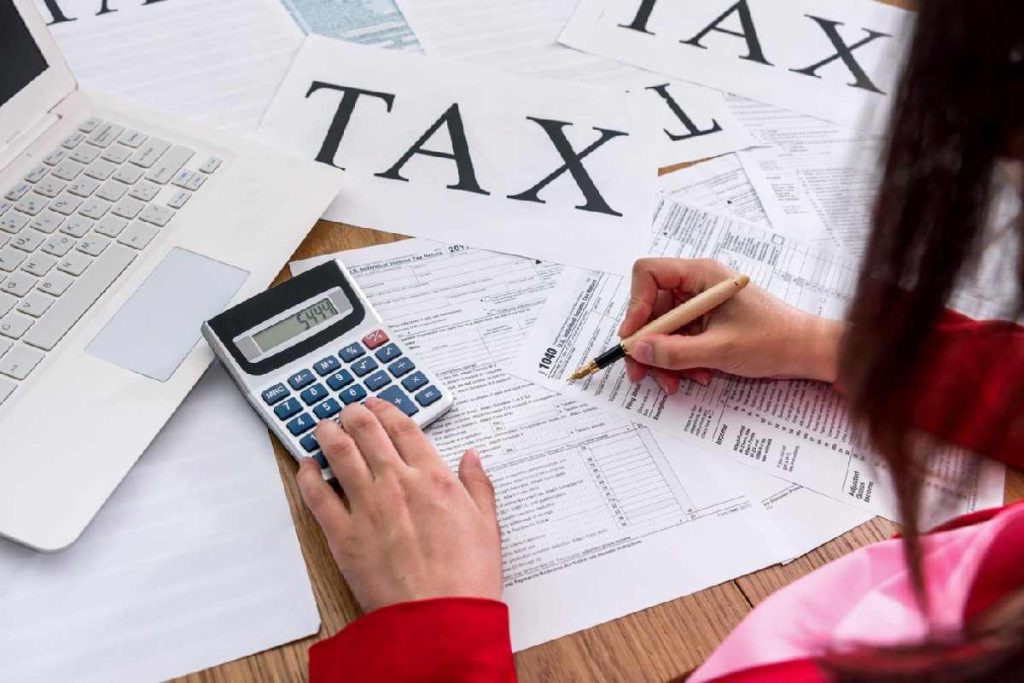Business’s Taxes: Having your own business comes with a lot of perks and rewards, but that also means extra responsibilities that employees don’t have – and the stress that goes with them.
Planning year-end taxes isn’t a fun activity for most people, leading to a lot of procrastination leading into tax time. But if you wait until the last minute, you’re only leaving yourself in an expensive position with possibly overpaying your taxes.
Table of Contents
Benefits of Tax Planning All Year
It may seem simple enough but planning your taxes all year round is the key to having a relaxed tax season and putting yourself in a position to maximize deduction and avoid overpaying.
Here are some benefits of tax planning all year:
Reducing Your Tax Liabilities
Your tax plan should focus on reducing your tax liabilities, which is the payment you owe for federal and state taxes for your income as a self-employed taxpayer or profits as an S corp in California.
Reducing liabilities isn’t as simple as it sounds, however, especially if you’re in a rush to meet the tax deadline.
When you prepare for your taxes all year long, you can make sure that you’re taking a strategic approach to your deductions and limiting mistakes that can lead to overpayment or possible fines and penalties.
Planning your taxes also gives you control over when you pay your tax bill, which is a big help for your cash flow.
If you have revenue toward the end of the year that may put you in the next tax bracket, for example, you could choose to defer it into the new year by setting up invoices for January or adjusting due dates.
You could also reduce your taxable revenue by spending money on office supplies or technology.
Deferring your income or making business purchases goes a long way toward reducing your taxes, but only do this is if you have the cash on hand. Reducing your tax liability is great, but it shouldn’t come at the cost of being “cash poor” through the end of the year.
Stay Up on Tax Laws
Tax laws change all the time, especially for certain industries or for small business owners. The pandemic brought a lot of changes, as did the shift in presidential administration, creating new tax requirements for small businesses.
As a self-employed taxpayer, it’s your responsibility to keep up with the changes to tax laws and requirements.
If you don’t have a tax planning strategy in place, it’s easy to miss these details that may change the way you approach your taxes. Worse yet, you could end up noncompliant.
Gain an Understanding of Your Financial Health
The main goal of year-round tax planning is to reduce liabilities, but there is a side benefit – financial visibility. As you plan your taxes, you’ll get a view of your business’s financial health by default.
This gives you the insight to make decisions and spend money that fuels your business growth.
In addition, with an idea of how your money ebbs and flows through the year, you can prepare for possible deductions to save on your tax bill. All those savings can go right back into your business.
Tips for Year Round Tax Planning
Don’t Wait Until the Last Minute
Procrastination is natural, especially if the task is something you dread doing. If you put off your tax planning activities until the next day, when the time is right, or after a project, it’ll be tax time before you even realize it.
Don’t procrastinate! Set aside time in your schedule every few weeks for your tax responsibilities. You can block off time, set reminders on your calendar, or get another person to hold you accountable.
However you do it, just make sure you don’t put off these activities until the end of the year.
Take the Time to Assess Your Financial Health
Planning your taxes gives you a good view of your business’s financial health. Take a look at your financial statements while you’re working on your tax planning activities.
The primary ones you should focus on include the balance sheet, income statement, and cash flow statement.
Together, these financial statements give you a comprehensive view of your business’s financial health and any losses or gains you had throughout the year.
If you notice a pattern, try to make adjustments to get a better handle on your finances.
For example, if you have too many expenses, see where there’s unnecessary waste and where you can cut back. Having a few years of financial statements gives you more information to establish patterns and notice gaps or opportunities.
Make Business Purchases
Any self-employed taxpayer or business owner wants to maximize deductions, and one of the best ways to do that is to make business-related purchases before the year ends.
There are plenty of things you can purchase that are a qualified deduction your business will use, such as:
- Computers, printers, scanners, etc.
- Paper, pens, file folders, pencils, etc.
- Industry machinery
- Office or industry-specific Software
- A company vehicle
If you don’t need these items, consider other purchases that you can make for anything that’s running low or nearing the end of its lifespan.
For example, offices tend to use a lot of folders and paper. Older technology could always use an upgrade as well.
Defer or Accelerate Income
Deferring income can be a great way to reduce your tax liability. Any income you receive by December 31st of the current year counts as that year’s income.
You can reduce your tax liability by postponing that income until after January 1st to put it into the next tax year.
If you can afford to do this, it has a lot of benefits. You have more time to pay your taxes on that income and you can change your tax bracket to get a lower rate.
How you defer your income depends on your accounting method. Cash-basis accounting allows you to delay income by sending invoices late or making the due dates in the next year.
Of course, this also means you won’t get that money until the current year.
You can also accelerate income into the current year if your business is in a strong position and you expect to be in the higher tax bracket.
Accelerating income helps you collect more payments this year, ensuring that more income is taxed at your current tax rate.
Figure Out Your Tax Deductions
It’s always helpful to know what tax deductions you’re eligible for. Some of the main ones that apply to most businesses are:
- Home office deduction
- Travel expenses
- A business vehicle
- Employee expenses
- Charitable contributions
While there are many possible deductions for business-related expenses, some of them are under scrutiny. Be sure to follow the IRS rules or consult with a tax professional before claiming your deduction.
Claim Bonus Depreciation
If you purchased furniture, vehicles, equipment, or technology for your business, you may be eligible for depreciation. Typically, these purchases are assets that factor into your business’s financial standing, so tax rules require you depreciate them with use.
Conversely, bonus depreciation lets you write off that depreciation on your return for a deduction. Not all assets qualify for bonus depreciation, though, so be sure to consult with a tax professional.
Establish a Retirement Plan
If you don’t already have a retirement plan, the end of the year is a good time to start one. You can deduct the establishment or contributions to your retirement account to reduce your taxable income.
The tax rules are different for simple IRA, Roth IRA, and 401(k), so be sure to discuss your options with a professional to determine the best choice for your circumstances.
Keep Detailed Records
Keeping detailed records is the biggest part of being tax efficient. The better you organize your documents, the better prepared you’ll be come tax time.
There are different accounting processes you can use for your tax preparation, including manual methods with spreadsheets and paper receipts, accounting software, or hiring an accountant.
Manual methods are inexpensive but extremely time consuming and error prone. An accountant makes the process simple, but it may be too expensive for some circumstances.
The best of both worlds is accounting software, which provides support for your accounting needs and better organization, even if you want to work with a tax professional at some point.
You can manage everything from financial reports to bookkeeping to tax payments to relieve the administrative burden and shift your attention back to your own business.
Some accounting software offers features to help you manage your taxes throughout the year as well, such as tax estimates, reporting income and expenses, and reporting life changes. You can also get industry-specific solutions, such as real estate accounting software.
Get Tax Happy
What does it mean to be “tax happy?” when you plan your taxes all year long, you can enjoy a stress-free and efficient tax season that positions your business for growth and success.
Author Bio:

Name: Shahar Plinner
Shahar is a tax and accounting expert with over 20 years of experience in the field. He is an entrepreneur and known as The Tax Guru on the west coast.
Shahar moved to Seattle from Israel and founded, scaled, and sold a leading tax and accounting firm in the Seattle Metro area.
Over the years, he served thousands of business owners and perfected the playbook for self-employed tax strategy. That’s why he founded Formations, to make sure the self-employed never overpay on taxes again.

